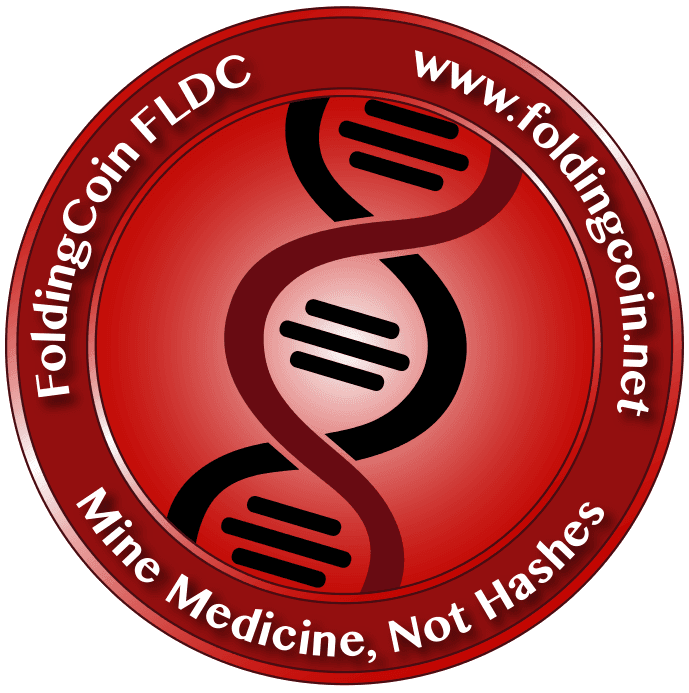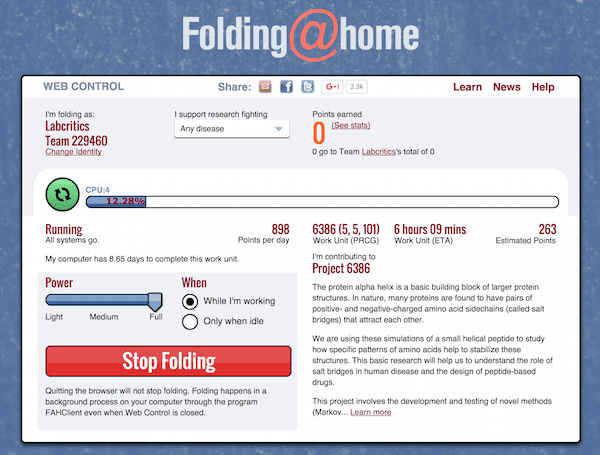Contribute Processing Power to Science and Earn CryptoCurrency

Stanford University based distributed computing platform Folding@Home has launched Foldingcoin, a new Cryptocurrency platform to award CPU & GPU contributors for to tabulate and analyse complex diseases.
Folding@Home started in early 2000 with the aim of using distributed computing to understand diseases resulting from protein misfolding and aggregation, with an emphasis on protein structure prediction.The Folding@home project has been part of BOINC (Berkeley Open Infrastructure for Network Computing) along with other projects like SETI@home and Rosetta@home among others. Their focus is on but not limited to diseases such as Cancer, Alzheimer’s, Huntington disease and Parkinson’s. Until now CPU contributors had no reward for contributing, not even the instant gratification of having helped the world get rid of a disease, since it takes decades before any progress is seen.
Bitcoin network has grown huge and mining on bitcoin networks requires lots of processing power, which comes at the cost of excess energy consumption. All these, to solve mathematical equations of no special significance. By adding a Bitcoin 2.0 based cryptocurrency reward system, Foldingcoin seeks to attract more people and retain them longer with gamification elements included. Users can join teams and complete tasks or Work Units together faster to get awarded bonus points. Tokens are rewarded each day based on the tasks completed the prior day. Work units are essentially protein folding tasks that once finished are sent to the Folding@Home servers. Currently, on a daily basis 500,000 coins are distributed to the CPU contributors based on the credits generated. The daily coin or token distribution is set to come down as time progresses, since there are only 7 billion Foldingcoins available. This will also mean the value of the successive Foldingcoins and the previously distributed ones will increase proportionally (Ex: The value of bitcoins rose from 6 cents when it began to more than $1000 in three years). These coins can also be converted into other cryptocurrencies such as Bitcoin or Altcoin.
Cryptocurrency miners have long dedicated considerable computing to mine hashes that essentially help in enabling transactions, in return for freshly minted Bitcoins. At Foldingcoin miners will be helping understand diseases and create new drugs instead. With Foldingcoin, Folding@Home is hoping to attract these professional miners to focus their computing power to a more useful purpose and earn in return. According to their current stats, 146,277 computers are contributing 24,737 teraflops of computing power.
Self Sustaining Research Computing
Maybe in the future Foldingcoin could be a universal currency for all forms of research based on distributed computing platforms. Such a system could help the personalised drug industry, which is expected to require humongous amounts of processing power to analyse genes of individuals to formulate new drugs, making personalised medicine affordable. Of course, the biggest beneficiaries here will be universities which can expand their computing power immensely without investing as much, through a self sustaining cryptocurrency platform.
Installing Fold@Home
Setting up and installation of the V7 Foldingcoin computing software is simple with multi OS versions and even Android 4.4.4 support. Find installation tutorials here. It requires internet connection to communicate and receive new tasks from the Folding@Home servers.
Join our team 229460 on Folding@Home. We are working in project 6386 to understand the role of salt bridges in human disease and the design of peptide-based drugs. This project involves the development and testing of novel methods (Markov State Models) and their application to protein folding. Just add the no. 229460 to your team number and begin contributing. Our aim is to solve at least 50 protein structures by the end of the year; help us get there.
Source: FoldingCoin

